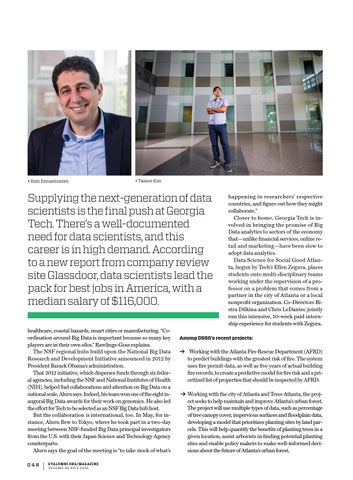∏ Hadi Esmaeilzadeh
∏ Taesoo Kim
Supplying the next-generation of data scientists is the final push at Georgia Tech. There’s a well-documented need for data scientists, and this career is in high demand. According to a new report from company review site Glassdoor, data scientists lead the pack for best jobs in America, with a median salary of $116,000. healthcare, coastal hazards, smart cities or manufacturing. “Coordination around Big Data is important because so many key players are in their own silos,” Rawlings-Goss explains. The NSF regional hubs build upon the National Big Data Research and Development Initiative announced in 2012 by President Barack Obama’s administration. That 2012 initiative, which disperses funds through six federal agencies, including the NSF and National Institutes of Health (NIH), helped fuel collaborations and attention on Big Data on a national scale, Aluru says. Indeed, his team won one of the eight inaugural Big Data awards for their work on genomics. He also led the effort for Tech to be selected as an NSF Big Data hub host. But the collaboration is international, too. In May, for instance, Aluru flew to Tokyo, where he took part in a two-day meeting between NSF-funded Big Data principal investigators from the U.S. with their Japan Science and Technology Agency counterparts. Aluru says the goal of the meeting is “to take stock of what’s 0 4 8
GTALUMNI.ORG/MAGAZINE VOLUME 92 NO.2 2016
happening in researchers’ respective countries, and figure out how they might collaborate.” Closer to home, Georgia Tech is involved in bringing the promise of Big Data analytics to sectors of the economy that—unlike financial services, online retail and marketing—have been slow to adopt data analytics. Data Science for Social Good Atlanta, begun by Tech’s Ellen Zegura, places students onto multi-disciplinary teams working under the supervision of a professor on a problem that comes from a partner in the city of Atlanta or a local nonprofit organization. Co-Directors Bistra Dilkina and Chris LeDantec jointly run this intensive, 10-week paid internship experience for students with Zegura.
Among DSSG’s recent projects:
Working with the Atlanta Fire Rescue Department (AFRD) to predict buildings with the greatest risk of fire. The system uses fire permit data, as well as five years of actual building fire records, to create a predictive model for fire risk and a prioritized list of properties that should be inspected by AFRD. Working with the city of Atlanta and Trees Atlanta, the project seeks to help maintain and improve Atlanta’s urban forest. The project will use multiple types of data, such as percentage of tree canopy cover, impervious surfaces and floodplain data, developing a model that prioritizes planting sites by land parcels. This will help quantify the benefits of planting trees in a given location, assist arborists in finding potential planting sites and enable policy makers to make well-informed decisions about the future of Atlanta’s urban forest.
